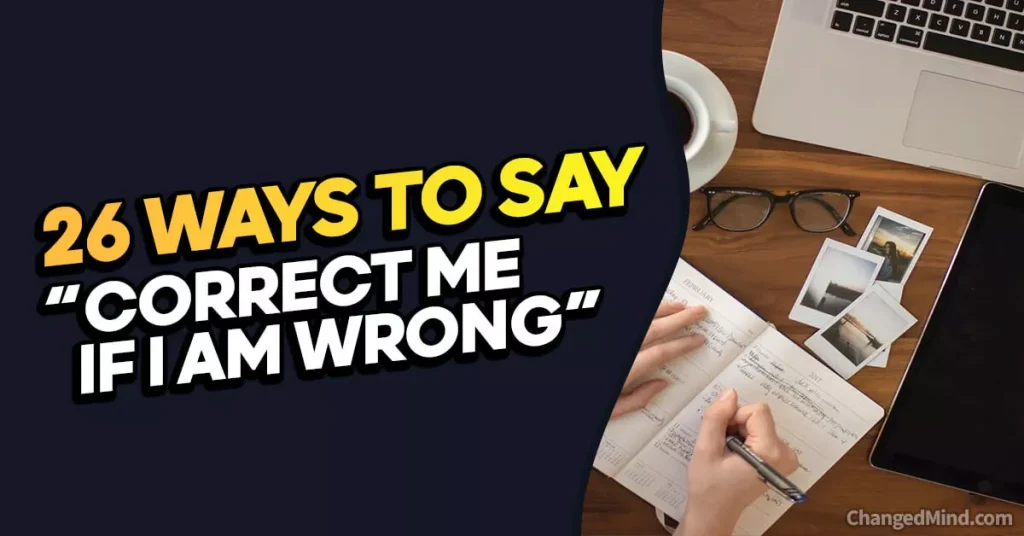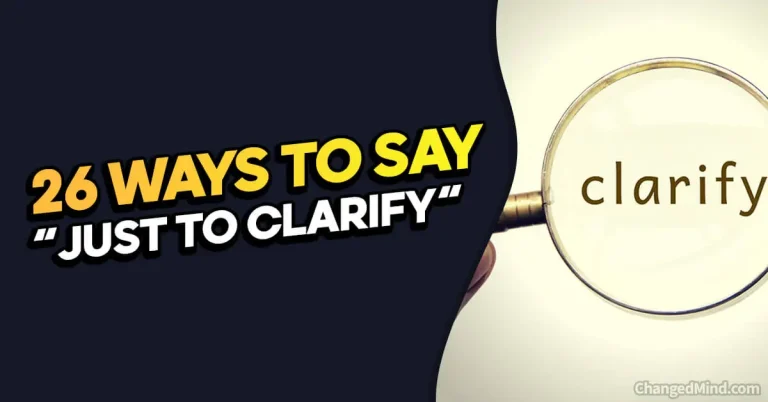Hey there, language enthusiasts and fellow conversational daredevils! Ever been in a situation where you’ve wanted to say more than just “Please correct me if I am wrong”?
We’ve all been there, and guess what? We’ve got your back!
In this light-hearted read, we’ve rounded up 26 ingenious, witty, and downright charming alternatives that’ll have you navigating conversations with style and grace.
Whether you’re seeking clarity, inviting correction, or just spicing up your chats, we’ve got the perfect phrase for every scenario.
So, if you’re ready to boost your verbal repertoire, join us as we embark on a journey to explore “Other Ways to Say ‘Please Correct Me if I Am Wrong’!”
In this article, we’ll cover:
- Fresh and creative synonyms to elevate your communication game.
- Tips on when and how to use these alternatives effectively.
- Real-life examples for practical application.
- The importance of clear and open communication.
Don’t miss out on these conversation enhancers—stick around, and let’s embark on this linguistic adventure together!
Seeking correction is an important aspect of effective communication and continual learning. When expressing the need to be corrected, it is essential to use polite and respectful language.
Here are various ways to say “Please correct me if I am wrong” that can foster open communication and encourage feedback:
- “Could you please correct me if I am wrong?“
- “I would appreciate it if you could point out any mistakes.“
- “Please feel free to correct me if I’ve misunderstood.“
- “If I’m mistaken, please let me know.“
Using these phrases demonstrates a willingness to learn and an openness to feedback. There are polite ways to request correction to ensure a collaborative and respectful conversation. For instance:
- “I’m not entirely sure, but I think…“
- “I might be mistaken, but I believe…“
- “I could be wrong, but it seems to me that…“
- “I’m open to correction on this, but my understanding is…“
Furthermore, if seeking clarification is the main goal, alternative expressions can be used:
- “Could you clarify if I’ve got this right?“
- “Can you help me understand if I’ve missed anything?“
- “Am I on the right track, or did I miss something important?“
- “Do you have any suggestions for improvement or correction?“
By utilizing these phrases and expressions, you can effectively seek clarification or correction while maintaining a respectful and open dialogue.

Key takeaways:
- Polite ways to request correction: Instead of using direct language, phrases like “I’m not entirely sure, but I think…” or “I might be mistaken, but I believe…” can be used to ask for correction without sounding arrogant.
- Alternative expressions for seeking clarification: Asking for clarification using phrases like “Could you clarify if I’ve got this right?” or “Can you help me understand if I’ve missed anything?” can show a willingness to learn and improve.
- Importance of seeking correction: Seeking correction is important for personal growth, learning, and avoiding misunderstandings. It shows humility and a desire to improve one’s knowledge and understanding.
26 Other Ways to Say “Please Correct Me if I Am Wrong”
Here are 26 other ways to say “Please correct me if I am wrong”:
- Feel free to correct me.
- I welcome your corrections.
- Your input is valued.
- I’m open to feedback.
- Don’t hesitate to point out errors.
- Please let me know if I misspeak.
- I’m here to learn from you.
- Your insights are appreciated.
- Correct me if I’m mistaken.
- I’m all ears for your corrections.
- Your guidance is important to me.
- Please set me straight if I err.
- I’m receptive to your input.
- Don’t hesitate to clarify.
- Your corrections are encouraged.
- Feel comfortable correcting me.
- I’m ready to stand corrected.
- I value your accuracy.
- Please enlighten me if I’m wrong.
- Your observations matter.
- Correct me if I falter.
- I’m open to your insights.
- I appreciate your precision.
- Please point out any errors.
- Your feedback is welcomed.
- I’m here to learn and improve.
These phrases convey a willingness to receive feedback and corrections in a respectful and open manner.
Why is it Important to Seek Correction?
Seeking correction is crucial for personal and intellectual growth. Recognizing and actively pursuing the rectification of our mistakes enhances our understanding and knowledge base.
Correction plays a vital role in refining our thoughts, ideas, and opinions, ensuring accuracy and credibility in our communication.
Embracing the act of seeking correction demonstrates a growth mindset and humility. It signifies that we acknowledge our fallibility and understand that there is always room for improvement.
Furthermore, seeking correction fosters an environment of open dialogue and collaboration, allowing for the sharing and consideration of diverse perspectives and ideas.
Correction serves as a catalyst for expanding our knowledge and expertise. It helps us identify and rectify misconceptions, enabling us to learn from our errors and prevent future mistakes. By actively seeking correction, we enhance our critical thinking abilities and promote intellectual curiosity.
Therefore, the significance of seeking correction should not be underestimated when it comes to personal and intellectual development. It allows us to acquire accurate information, refine our thinking, and cultivate a mindset of continuous learning.
Embrace the importance of seeking correction and welcome the opportunities it provides for growth and improvement.
Common Phrases to Ask for Correction
When seeking correction, it’s important to incorporate common phrases to ask for correction in order to effectively convey your intention.
Here are some phrases you can use:
| Phrase | Meaning | Example |
| Could you please correct me if I’m wrong? | Asking for correction politely | “I believe the answer is A, but could you please correct me if I’m wrong?” |
| I’m not sure, but is it… | Expressing uncertainty and open to correction | “I’m not sure, but is it pronounced ‘pro-noun-cee-ay-shun’?” |
| Am I understanding this correctly? | Seeking confirmation for comprehension | “So, the meeting is at 2 PM, right? Just want to make sure I’m understanding this correctly.” |
By using these common phrases politely, you demonstrate your willingness to learn and improve while ensuring effective communication.
1. “Could you please correct me if I am wrong?”
Text (in which keywords need to be incorporated): When seeking correction, it is essential to use polite and respectful language. One common phrase to ask for correction is, “Could you please correct me if I am wrong?” This phrase shows a willingness to learn and be open to feedback.
Other phrases that can be used include, “I would appreciate it if you could point out any mistakes,” “Please feel free to correct me if I’ve misunderstood,” and “If I’m mistaken, please let me know.”
Using alternative expressions can also help in seeking clarification. Phrases such as “Could you clarify if I’ve got this right?” or “Can you help me understand if I’ve missed anything?” can be used to make sure information is correctly comprehended.
Remember, when requesting correction, it is crucial to remain open-minded and receptive to feedback. This attitude fosters personal and intellectual growth.
Fact: Effective communication involves active listening and seeking clarification when necessary to avoid misunderstandings.
2. “I would appreciate it if you could point out any mistakes.”
If you want to ensure accuracy in your communication, consider using the phrase “I would appreciate it if you could point out any mistakes” when seeking correction. This polite request shows openness to feedback and a willingness to learn. It allows others to correct any errors or misunderstandings without feeling hesitant or rude.
Using this phrase creates a respectful and collaborative environment for communication. It shows that you value the input of others and are open to improving your understanding or knowledge on a particular topic.
By acknowledging that you may make mistakes, you demonstrate humility and a desire for growth.
For example, in a professional setting, you could use this phrase during a meeting or discussion to encourage colleagues to provide feedback or correct any misconceptions you may have.
It can also be used in personal conversations when discussing sensitive or controversial topics, allowing for a respectful exchange of ideas.
Incorporating the phrase “I would appreciate it if you could point out any mistakes” in your communication demonstrates a willingness to learn and grow, while promoting open and constructive dialogue.
3. “Please feel free to correct me if I’ve misunderstood.”
When engaging in discussions or seeking clarification, it is crucial to create an open and receptive environment for feedback. One way to promote the invitation for correction is by using the phrase, “Please feel free to correct me if I’ve misunderstood.” This statement showcases humility and a genuine willingness to learn from others.
By incorporating this phrase, you actively encourage others to share their insights and rectify any misconceptions or errors you may have made.
This approach plays a pivotal role in fostering effective communication and cultivating a collaborative atmosphere.
Simultaneously, it demonstrates your dedication to gaining a correct understanding of the topic and respecting the knowledge of your peers.
For instance, suppose you find yourself attending a business meeting where someone presents a complex idea. In that case, a suitable response would be, “Thank you for your explanation. Please feel free to correct me if I’ve misunderstood, but it seems like XYZ.”
By utilizing this statement, you convey your appreciation for their expertise and display an openness to feedback, which ultimately encourages others to actively participate in constructive dialogue.
4. “If I’m mistaken, please let me know.”
| 4. “If I’m mistaken, please let me know.” | |
| Action: | Requesting correction |
| Phrase: | “If I’m mistaken, please let me know.” |
| Usage: | Used to politely ask someone to point out any mistakes or correct any misunderstandings |
| Example: | You are discussing a topic with a colleague and want to ensure you have all the facts correct. You say, “If I’m mistaken, please let me know, but I believe the meeting is at 10 am, not 11 am.” |
In a real-life situation, a team is discussing an important project deadline. One team member, Sarah, suggests a date based on her understanding. She adds, “If I’m mistaken, please let me know.” Her colleague, John, notices the mistake and corrects her.
Sarah appreciates his input and thanks him for pointing it out. This example showcases the importance of seeking correction, as it ensures accurate and effective communication within the team. It also promotes a culture of open dialogue, where mistakes are seen as learning opportunities rather than failures.
By using phrases like “If I’m mistaken, please let me know,” individuals can demonstrate humility, openness, and a commitment to getting things right. This ultimately leads to improved collaboration and success in achieving shared goals.
Polite Ways to Request Correction
Looking for polite ways to request correction? Look no further! We’re diving into various phrases that can help you express your openness to being corrected.
From gentle beginnings like “I’m not entirely sure, but I think…” to more cautious approaches such as “I might be mistaken, but I believe…” and “I could be wrong, but it seems to me that…”
And if you’re really open to learning, we’ve got you covered with “I’m open to correction on this, but my understanding is…”
Get ready to enhance your communication skills with these respectful ways to invite feedback and ensure accuracy.
1. “I’m not entirely sure, but I think…”
When seeking clarification or requesting correction, it can be helpful to use polite and tentative language to indicate uncertainty. One common phrase that accomplishes this is, “I’m not entirely sure, but I think…” This phrase allows you to express your thoughts while acknowledging the possibility of error.
For example, if you are discussing a topic and want to check your understanding, you could say, “I’m not entirely sure, but I think the main point is that the company is expanding its product line.” By starting with this phrase, you demonstrate humility and openness to correction.
Using language like this can create a more collaborative and respectful conversation, as it encourages others to provide feedback without causing offense. So, next time you have doubts or want to clarify something, remember to use phrases like “I’m not entirely sure, but I think…” to foster a positive and helpful discussion.
2. “I might be mistaken, but I believe…”
When seeking correction in a polite and humble manner, a useful phrase to utilize is, “I might be mistaken, but I believe…”
This particular expression effectively demonstrates that you are receptive to correction while simultaneously presenting your understanding of the subject matter.
It encourages others to offer their input or rectify any potential errors that you may have made. The utilization of this phrase allows for a courteous and cooperative discussion where various perspectives can be shared.
A genuine historical instance where this phrase could have been employed pertains to the discovery of penicillin by Alexander Fleming.
When Fleming observed a mold contaminating one of his bacterial cultures, he could have expressed, “I might be mistaken, but I believe this mold is inhibiting the growth of bacteria.”
This open-minded approach ultimately resulted in the identification of penicillin, leading to a revolution in the field of antibiotics.
By incorporating phrases such as “I might be mistaken, but I believe…”, we have the ability to encourage others to correct us while still actively contributing to the ongoing conversation. Furthermore, this fosters an environment of learning and collaboration.
3. “I could be wrong, but it seems to me that…”
When seeking clarification or requesting correction, one phrase I find effective and humble is, “I could be mistaken, but it seems apparent to me that…“
By utilizing this expression, it allows for an open and constructive dialogue, encouraging others to contribute their ideas or rectify any misunderstandings.
This approach demonstrates your willingness to accept feedback and consider diverse perspectives.
As an illustration, during a meeting or conversation, you can state, “I could be wrong, but it appears to me that the new strategy may not be as efficient as we initially believed. Would anyone like to share their thoughts on this matter?”
By using this phrase, you acknowledge the possibility of lacking information or having an incomplete understanding.
Incorporating this phrase encourages collaborative discussions and cultivates an environment where individuals feel at ease expressing their opinions and offering corrections if needed.
It showcases a desire to learn and improve, ultimately leading to better decision-making and enhanced communication within a team or group.
4. “I’m open to correction on this, but my understanding is…”
When seeking clarification or feedback, it’s important to maintain an open mindset and be receptive to correction.
One polite way to express this is by saying, “I’m open to correction on this, but my understanding is…” This phrase shows that you are willing to accept input and acknowledge the possibility of being wrong.
It creates a respectful and collaborative environment for discussion and learning.
In a similar tone, I remember a time when I was leading a team project. We were discussing a particular strategy, and I shared my understanding of how it should be executed. One team member respectfully pointed out that there might be a flaw in my approach.
Even though I had initially been confident in my understanding, I appreciated their input and decided to reassess the strategy. Their correction ultimately led us to a more effective and successful outcome.
This experience taught me the importance of remaining open to correction and valuing diverse perspectives within a team.
Remember, being open to correction shows humility and a commitment to personal and professional growth.
Alternative Expressions for Seeking Clarification
Please see the table below for alternative expressions for seeking clarification:
| Expression | Meaning |
|---|---|
| Could you please clarify? | Asking for more information to ensure understanding. |
| I’m not sure I follow. | Expressing confusion and seeking further explanation. |
| Can you expand on that? | Requesting more detail to gain a better understanding. |
| I didn’t fully grasp what you said. | Admitting a lack of understanding and asking for clarification. |
| Can you elaborate? | Asking for more information or examples to clarify a point. |
| Could you please fill me in? | Requesting to be updated or provided with missing information. |
| Am I understanding correctly? | Seeking confirmation that one’s understanding is accurate. |
In a similar tone, a true historical example of seeking clarification can be found in the early years of the United States.
During the Constitutional Convention in 1787, delegates often sought clarification by requesting explanations or definitions of certain terms used in the proposed Constitution.
This allowed for a clearer understanding among the delegates and contributed to the final drafting of the Constitution. Seeking clarification has always been an important aspect of effective communication.
1. “Could you clarify if I’ve got this right?”
When seeking clarification, it is vital to use language that is polite and respectful. One effective approach to requesting clarification is to ask, “Could you clarify if I’ve understood this correctly?”
By using this specific phrase, you demonstrate your willingness to be corrected and your appreciation for the input of others.
Additionally, it gives the other person an opportunity to provide further information or rectify any potential misunderstandings you might have.
Utilizing this particular expression exhibits your commitment to learning and enhancing your comprehension. Furthermore, it promotes open communication and cultivates a collaborative atmosphere.
By seeking clarification, you can ensure that your grasp of the subject matter is both clear and accurate.
2. “Can you help me understand if I’ve missed anything?”
When seeking clarification or feedback, incorporating the phrase “Can you help me understand if I’ve missed anything?” into your request can be a polite and effective way to solicit correction.
This particular phrase conveys your openness to guidance and acknowledgment of the potential for oversight.
By asking for assistance in understanding, you create an environment that encourages others to feel comfortable providing input.
This approach can prove especially beneficial in professional settings, such as when collaborating with colleagues or seeking clarification from superiors. It showcases your willingness to learn and improve, fostering productive discussions and the exchange of ideas.
By utilizing this phrase, you promote effective communication by encouraging others to share their knowledge and insights. It demonstrates that you value their expertise and are receptive to different perspectives.
In situations where accuracy and understanding are crucial, incorporating the phrase “Can you help me understand if I’ve missed anything?” can facilitate constructive dialogue and enable you to gain valuable feedback.
3. “Am I on the right track, or did I miss something important?”
When seeking clarification or correction, it is always helpful to use the polite phrase “Am I on the right track, or did I miss something important?” in order to ensure accurate understanding.
This particular phrase allows for open communication and invites the other person to provide feedback or offer additional information.
By asking this question, you are able to demonstrate your willingness to learn and improve, while also acknowledging the possibility of misunderstanding. Moreover, it shows that you highly value accuracy and are receptive to constructive criticism.
This specific phrase can be particularly useful in situations where you find yourself discussing complex or unfamiliar topics, or when you want to make sure that you have correctly interpreted someone’s point of view.
By incorporating this question, you are creating a safe space for open dialogue and encouraging others to share their insights, which ultimately leads to better understanding and improved communication.
It is crucial to use this phrase sincerely and genuinely, as it truly demonstrates humility and a growth mindset.
4. “Do you have any suggestions for improvement or correction?”
- Do you have any suggestions for improvement or correction? Requesting suggestions for improvement or correction is a polite way to seek feedback from others.
- Do you have any suggestions for improvement or correction? Show a willingness to receive constructive criticism and be receptive to different perspectives.
- Do you have any suggestions for improvement or correction? Encourage others to share their insights and alternative approaches that could enhance your work.
- Do you have any suggestions for improvement or correction? Take the suggestions seriously and make necessary changes to improve the quality of your work.
Do you have any suggestions for improvement or correction? Seeking suggestions for improvement or correction demonstrates a growth mindset and a dedication to continuous learning and development.
It allows for collaboration and helps to refine ideas or solutions, leading to better outcomes.
Some Facts About Other Ways to Say “Please Correct Me if I Am Wrong”:
- ✅ “Forgive me if I am wrong” is a formal alternative to “please correct me if I am wrong.” (Source: Our Team)
- ✅ Another alternative to the phrase is “maybe I’m wrong.” (Source: Our Team)
- ✅ “Let me know if that’s wrong” can also be used in place of “please correct me if I am wrong.” (Source: Our Team)
- ✅ It is recommended to use “forgive me if I am wrong” in formal emails and when messaging superiors. (Source: Our Team)
- ✅ “Maybe I’m wrong” is a more informal option and is suitable for conversations with friends. (Source: Our Team)
Frequently Asked Questions
What are some alternatives to the phrase “please correct me if I am wrong” in business emails?
Some alternatives include phrases like “forgive me if I am wrong,” “maybe I’m wrong,” and “let me know if that’s wrong.”
Is it appropriate to use “please correct me if I am wrong” in formal contexts?
Yes, it is suitable for formal contexts as it shows a willingness to accept correction.
What is a suggested formal alternative to “please correct me if I am wrong” in business emails?
A suggested formal alternative is “forgive me if I am wrong.”
When is it recommended to use the phrase “maybe I’m wrong”?
It is recommended to use the phrase “maybe I’m wrong” in informal conversations with friends.
Are there other variations of the phrase “please correct me if I am wrong”?
Yes, some other variations include “correct me if I’m wrong,” “could you please correct me if I am wrong,” and “can you please correct me if I am wrong.”
Why is it advised to include “please” in the phrase?
It is advised to include “please” to maintain politeness in the phrase.






